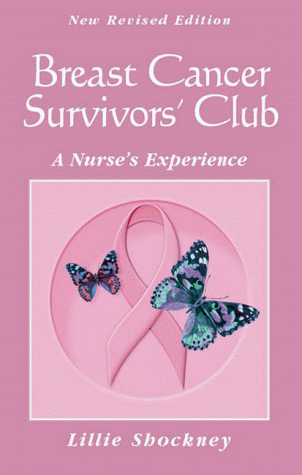The Breast Cancer Survivor's Club
encontrar mi
Author: Lillie Shockney, RN, MAS |
This is a true story of a woman named Lillie Shockney, who has had "the unique opportunity to experience breast cancer from three different perspectives: as a teenager who watched the impact of a diagnosis of breast cancer on someone (she) loved and feared losing; as a registered nurse who cared for women treated for the disease; and as a woman who became a mastectomy patient."
The majority of the book is devoted to Shockney's personal account of her own experience. With candid honesty, she tells of the fear and uncertainty while awaiting the results of her biopsy, and the shock upon hearing the confirmation of the diagnosis of breast cancer. Shockney is fortunate to be supported by a wonderful husband, a bright daughter, caring family members and friends, and a loyal group of co-workers. Perhaps one of the most touching moments in the book comes when Shockney has just returned to her room following the mastectomy and reads a poem written for her by her 12 year old daughter Laura:
Appearance
Nobody's perfect;
Just look at me
But if you really think about it
Who wants to be?
Beauty and glamour
Are nice to get
But it's what's inside that counts;
You must never forget
I hope you understand
What I've been trying to say
I hope you get well soon
And I love you more and more each day
With that, Shockney starts on her road to recovery.
Humor is used extensively throughout the book. With the logic that her prosthesis was going to become a family member and would be spending a lot of time with her, Shockney decides to name it. "Her name is Betty - Betty Boob to be precise." She also names her prosthesis for swimming - her name is Esther (as in Williams). Humor is also used when Shockney describes the games that she and her husband created to ease the nervousness that each felt as they began to resume intimate relations.
There are special chapters in the book designed to address specific issues and concerns. In "The Parent's Chapter" Shockney's parents individually describe their feelings, thoughts, and emotions associated with their daughter's diagnosis. In "Helpful Hints for Breast Cancer Patients, their Families, and Concerned Friends" Shockney offers practical advise on helping the woman to retain her femininity and womanliness, provides a list of resources that will benefit the breast cancer patient and information that is valuable to the husband/significant sweetie, and concludes with a list of DOs and DON'Ts for the woman about to undergo a mastectomy.
Shockney delivers a powerful message about the importance of preventive care and she encourages people to move from being watchers to being doers in the fight against breast cancer.
This is a very honest and touching look at one woman's experience with breast cancer. Not only can it be a source of inspiration to many other women diagnosed with the disease, but can also provide invaluable insights for spouses, significant others, parents, family members, friends and co-workers.

